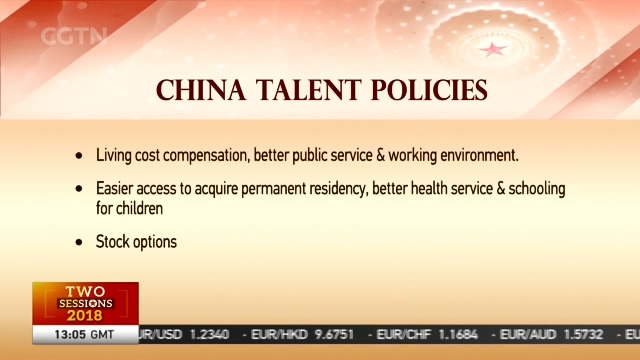
21:31, 15-Mar-2018
China Woos Talent: Tapping into talent dividend is critical for future growth

President Xi Jinping stressed the importance of nurturing local talent and attracting foreign professionals during this year's Two Sessions. Lawmakers and companies are changing the rules and providing incentives to attract skilled workers. Guan Xin has the story.
China has a massive appetite for top-drawer talent.
President Xi Jinping said during a meeting with NPC deputies that innovation was a key driving force for China's new economy--and that force was rooted in bringing in new talent.
The race for quality talent is on. Hangzhou in south-east China--Alibaba's birthplace, has become a breeding ground for high-end equipment and bio-pharmaceutical firms. Hangzhou's perks packages for talent include living costs compensation, better public services and a good working environment. The city also made it easier for migrant workers to get permanent residency and access health services and schooling for their children. Meanwhile, companies are offering stock options to boost staff loyalty.
Another key source of talent in China is rural migrant workers. Government data shows that most of the estimated 300 million migrant workers in China last year were from rural areas. That might be good for China's urbanization, but issues like village labor shortages and "left behind" children are unresolved. The central government has said it will expand its "rural economy revitalization" strategy to counter those challenges.
China is also looking abroad for talent, by reforming immigration policies to foreign workers. Incentives include permanent residence permits, easing limits on international students interning and working in China and improving the legal framework for talent introduction and management.
China's demand for talent will only grow as the country transforms into a high-tech, innovation-based economy. For the past three decades, it was about the population dividend, the future would depend on tapping into the talent dividend. Guan Xin, CGTN.

SITEMAP
Copyright © 2018 CGTN. Beijing ICP prepared NO.16065310-3
Copyright © 2018 CGTN. Beijing ICP prepared NO.16065310-3